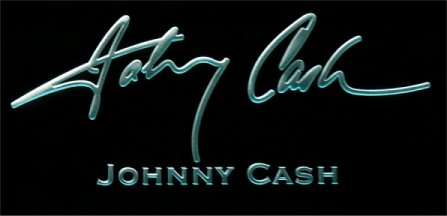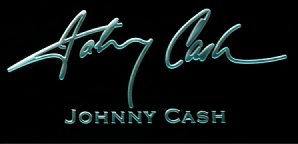Bill and Sue-On Hillman's Rock Tribute Series Born Feb. 26, 1932, in Kingsland, Ark., Johnny Cash was born John R. Cash, one of seven


Press Section
Official Bio
from
www.johnnycash.com/
children belonging to Ray and Carrie Rivers Cash. When John was 3 years old, his father took
advantage of a new Roosevelt farm program and moved his young family to Dyess Colony in
northeast Arkansas. There the Cash family farmed 20 acres of cotton and other seasonal crops,
and young John worked alongside his parents and siblings in the fields.Music was an integral part of everyday life in the Cash household. John soaked up a variety of
musical influences ranging from his mother's folk songs and hymns to the work songs from the
fields and nearby railroad yards. He absorbed these sounds like sponge absorbs water. In later years
Cash would draw from his life in Arkansas for inspiration: "Pickin' Time," "Five Feet High and
Rising" and "Look at Them Beans" are all reflections on Cash's early life.Cash remained in Dyess Colony until his graduation from high school in 1950. As a young man
he set off for Detroit in search of work. He ended up in Pontiac, Mich., and took work in an
automotive plant. His tenure in the North Country was short-lived and Cash soon enlisted in the
U.S. Air Force. After basic training in Texas (where he met first wife Vivian Liberto), he was
shipped to Landsberg, Germany. While in the service Cash organized his first band, the Landsberg
Barbarians.After his discharge in 1954, Cash returned stateside and married Liberto. He and his new bride
soon settled in Memphis where Cash worked a variety of jobs -- including that of appliance
salesman -- while trying to break into the music business.In 1954, Cash auditioned as solo artist for Sam Phillips' Sun Records. He entertained hopes of
recording gospel music for the label, but Phillips immediately nixed that idea. By the following
spring, though, Cash was in the Sun Studios to record with his band The Tennessee Three. The
original group consisted of guitarist Luther Perkins, bass player Marshall Grant and Red Kernodle
on pedal steel. Kernodle bailed out of the session and Cash's first release for the label, "Hey
Porter" had a sparse, but highly effective instrumental accompaniment. Though an impressive
single, the song failed to chart.Cash's follow-up release for Sun, however, fared substantially better. "Cry, Cry, Cry" managed to
crack Billboard's Top 20, peaking at No. 14. A long succession of chart singles followed. "So
Doggone Lonesome" and "Folsom Prison Blues" both broke into the trade publication's Top 10.
But Cash's fourth chart single proved to be his career song. "I Walk the Line" shot to Billboard's
No. 1 position and remained on the record charts for an incredible 43 weeks, ultimately selling
over 2 million copies.In 1956, he realized a longtime dream when he was invited to perform on the Grand Ole Opry.
By 1957 Cash had racked up an impressive string of hits and was working more than 200 dates a
year. The following year he switched to Columbia Records in search of more artistic freedom. He
still had aspirations of making gospel records and felt he had a better chance of accomplishing
this goal at another label.Throughout the remainder of the 1950s and into the 1960s, Cash continued to produce
remarkable records and charted consistently. "Don't Take Your Guns to Town," "I Got Stripes,"
"Ring of Fire," "Understand Your Man" and "The Ballad of Ira Hayes" all hit the upper registers
of the record charts. Appearances on The Ed Sullivan Show, The Tonight Show and other
top-rated network programs followed. In the early 1960s, concept albums such as Bitter Tears
and Ballads of the True West made him a favorite among the folk music crowd, culminating in an
appearance at the Newport Folk Festival.But all was not well. Cash was spinning out of control. His marriage was collapsing and divorce
seemed inevitable. Too, his grueling tour schedule (which was now up to 300 shows a year) had
taken its toll. Cash became dependent on narcotics to keep up the hectic pace. By the
mid-1960s, Cash was a deeply addicted and it began to impact his career.By 1967, though, Cash managed to overcome his addiction with the help of his singing partner
June Carter and her family. In 1968, he and Carter were married and his career experienced a
renaissance. Throughout the remainder of the decade and into the 1970s, Cash was at the top of
his game. A pair of live recordings made at Folsom Prison and San Quentin both went gold and a
passel of awards followed including the Country Music Association's Entertainer of the Year and
Male Vocalist awards in 1969.The final payoff though, was a network television spot. Premiering in 1969, The Johnny Cash
Show aired on ABC. Taped at Nashville's Ryman Auditorium, the show featured an eclectic mix
of guests ranging from Bob Dylan and Neil Young to Louis Armstrong and Merle Haggard.
Through his selection of guests, Cash helped bridge the generation gap and break down musical
barriers. He also used the show as a forum to discuss and raise the country's collective
consciousness about social issues of the day such as the plight of the Native Americans, prison
reform and the conflict in Vietnam. The show ceased production in 1971, but Cash continued to
host numerous specials for several years.In 1980, at the age of 48, Johnny Cash became the youngest living inductee into the Country
Music Hall of Fame. The Rock and Roll Hall of Fame bestowed its honor on him in 1995, thus
making him one of a handful of country artists in both organizations.In 1985, Cash joined friends Willie Nelson, Waylon Jennings and Kris Kristofferson to form The
Highwaymen. The supergroup released three albums between 1985 and 1995, scoring a No. 1 hit
with the single "Highwayman" from their first album, The Highwaymen. Although battling
serious health problems in the late 1990s, Cash entered a professional renaissance after signing
with rap producer Rick Rubin's American record label. American Recordings, released in 1994,
won a Grammy for best contemporary folk album. The follow-up, 1996's Unchained, earned the
Grammy for best country album in 1997. His 2000 release American III: Solitary Man, included a
cover of Neil Diamond's "Solitary Man," which won Cash a Grammy for best male country vocal
performance in 2001.In 2002, Cash released American IV: The Man Comes Around which included the Nine Inch Nails
single "Hurt." Cash earned three CMA awards in 2003, and the acclaimed video for "Hurt" won
an MTV award and a Grammy.After losing his wife June Carter Cash unexpectedly in May 2003, Johnny Cash passed away Sept.
12, 2003 at Baptist Hospital in Nashville, Tenn. from complications from diabetes.In 2005, a film version of his early romance with Carter, titled Walk the Line, was
Oscar-nominated for Best Picture. A single-disc compilation titled The Legend of Johnny Cash
was also released in 2005 and went on to sell more than two million copies. The following year,
Lost Highway released another of his American recordings, American V: A Hundred Highways,
featuring his some of his last sessions with Rubin.Johnny Cash and June Carter had seven children between them; Carlene Carter, Rosanne Cash,
Rosey Carter, Kathleen Cash, Cindy Cash, Tara Cash and John Carter Cash.Cash remains one of the only artists to sell over 90 million records.
Awards & Honors
Hall of Fame Inductions
1977 - Nashville Songwriters Hall of Fame
1980 - Country Music Hall of Fame
1992 - Rock and Roll Hall of Fame
Country Music Association
1968 - Album of the Year, At Folsom Prison
1969 - Vocal Group of the Year, with June Carter
1969 - Male Vocalist of the Year
1969 - Single of the Year, "A Boy Named Sue"
1969 - Album of the Year, At San Quentin
1969 - Entertainer of the Year
2003 - Music Video of the Year, "Hurt"
2003 - Single of the Year, "Hurt"
2003 - Album of the Year, American IV: The Man Comes Around
Grammy Awards
1968 - Best Country & Western Performance, Duet, Trio Or Group, "Jackson" (with June Carter
Cash)
1969 - Best Male Country Vocal, "Folsom Prison Blues"
1969 - Best Album Notes, At Folsom Prison
1970 - Best Male Country Vocal, "A Boy Named Sue"
1970 - Best Country Song, "A Boy Named Sue" by Shel Silverstein
1970 - Best Album Notes (written by Cash) for Bob Dylan's Nashville Skyline
1971 - Best Country Performance by a Duo or Group with Vocal, "If I Were A Carpenter", with
June Carter Cash
1987 - Best Spoken Word or Non-musical Album, Interviews From the Class of '55 Recording
Sessions, with Carl Perkins, Chips Moman, Jerry Lee Lewis, Johnny Cash, Ricky Nelson, Roy
Orbison and Sam Phillips
1995 - Best Contemporary Folk Album, American Recordings
1998 - Best Country Album, Unchained
1999 - Lifetime Achievement
2001 - Best Country Male Vocal, "Solitary Man"
2002 - Best Country Album, Timeless: Hank Williams Tribute (Cash contributed a cover of "I
Dreamed About Mama Last Night")
2003 - Best Country Male Vocal, "Give My Love To Rose"
2004 - Best Short Form Video, "Hurt", directed by Mark Romanek
2006 - Best Boxed or Special Limited Edition Package, "The Legend"
2008 - Best Short Form Video, "God's Gonna Cut You Down"
MTV Awards
In 2003 the video for Hurt, which was a cover of a Nine Inch Nails song, was nominated for six
MTV awards and won the Best Cinematography category.
Miscellaneous Awards
1985 - Single of the Year, "Highwayman" (with The Highwaymen) - Academy Of Country Music
1989 - Living Legend - Music City News
1991 - The Spoken Word - Angel Award (Cash's reading of the New Testament)
2002 - Spirit of Americana Free Speech Award - Americana Awards
2004 - Recorded Event Of The Year - International Bluegrass Music Association (IBM
